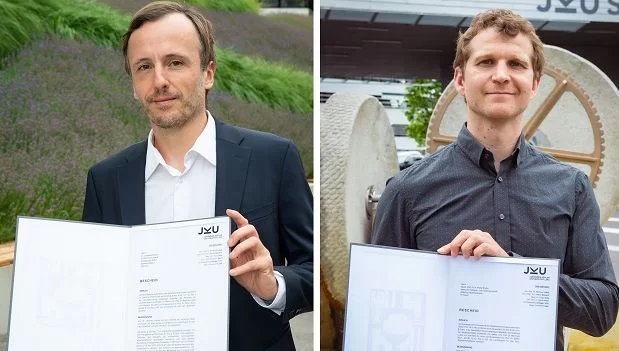Vice-Rector Alberta Bonanni presented Moritz Brehm and Johannes Preiner with their venia legendi/habilitation certificates.

Those pursuing a habilitation/post-doc undergo an academic evaluation in regard to special qualifications that proves their ability to independently conduct academic/scientific research and teach the entire depth and breadth of their selected subject area [facultas docendi], This, in turn, is the prerequisite to grant authorization to teach that particular subject area [venia legendi].
Moritz Brehm, an assistant professor and group leader at the Department of Semiconductor Physics, earned his post-doc with his dissertation titled "Epitaxial Group-IV Nanostructures: Site-Control and Optical Properties". Brehm's research group focuses on fabricating high-purity silicon-germanium layered crystals and their use in new types of nanoelectronic and optical devices, as well applications in quantum technology, particularly quantum photonics and quantum electronics.
Johannes Preiner conducted his research at the Institute of Biophysics. His post-doc dissertation titled "Protein Dynamics at the Membrane Interface" focuses on the question as to how multivalent interactions between proteins set biological processes on cell membranes in motion.
About Moritz Brehm
Brehm earned his PhD in technical physics at the JKU (Institute of Semiconductor and Solid-State Physics) in 2011. In 2012, he became an Erwin Schrödinger Fellow at the Austrian Science Fund (FWF). In 2019, the Austrian Science Fund presented Brehm with a €1.2 million START award, and in 2023, a solitary research project under the Quantum Austria Initiative. His current research group consists of four PhD candidates and three graduate students. He has published over 50 scholarly articles and held over 25 presentations as an invited speaker at international conferences.
About Johannes Preiner
Preiner is a research group leader at Upper Austrian University of Applied Sciences in Linz and a lecturer at the JKU. He earned his PhD at the JKU’s Institute of Biophysics (Prof. Peter Hinterdorfer), specializing in various methods of atomic force microscopy (AFM) and their biological applications. After earning his PhD, Preiner became one of Europe’s first experts in high-speed atomic force microscopy (HS-AFM). Preiner has authored over 30 peer-reviewed articles and book chapters and leads(s) and participates(s) in several ongoing and completed FWF, EFRE (Upper Austrian goverment), and FFG funded projects. He works together with an international biotechnology company to characterize therapeutic antibodies for use in cancer immunotherapy.














